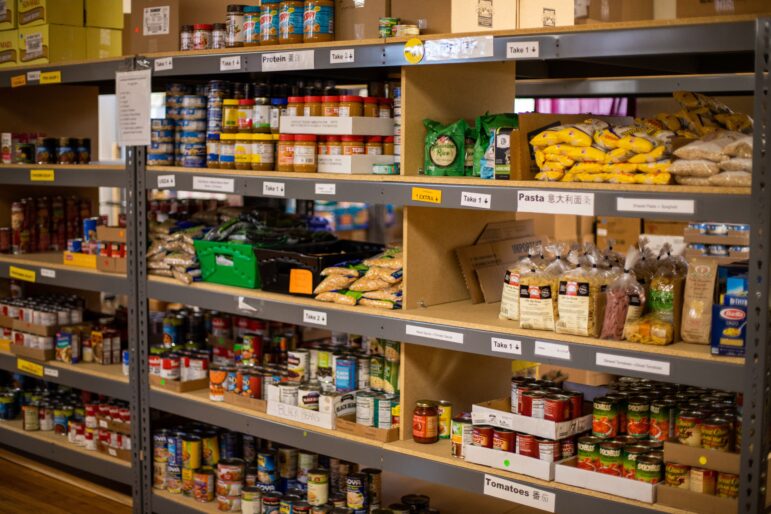California is poised to become the first state in the nation to extend food assistance benefits to some undocumented immigrants. But advocates say it’s not enough.
The budget bill the state legislature passed Monday includes a proposal by Gov. Gavin Newsom to allow immigrants age 55 and older who are currently shut out of food stamps programs to receive the benefits.
Advocates of the Food4All campaign — a coalition pushing for expanded food assistance to all immigrants, regardless of age or status — say that while the proposal is a step towards their long-term goal, it leaves a majority of low-income, undocumented immigrants behind.
“We need to be able to cover a whole family unit. It’s not the equitable thing to do to exclude some family members from food assistance,” said Betzabel Estudillo, senior advocate with Nourish California, an Oakland-based nonprofit.
The expansion will occur in the California Food Assistance Program, or CFAP, a state-funded version of food stamps that helps income-qualified immigrants who are not eligible for the federally-funded CalFresh program.
CFAP provides an average of $165 a month in food benefits to about 35,000 immigrants with legal status, primarily recent green card holders, according to the Legislative Analyst’s Office. Undocumented immigrants, those brought to the country illegally as children, and those granted temporary legal status because their countries experienced war or disaster, don’t qualify for the program.
“The governor’s proposal will result in California being the first state in the nation to remove exclusions from food assistance programs for undocumented residents over the age of 55,” said Benyamin Chao, a health and public benefits analyst with the California Immigrant Policy Center.
A February analysis by the nonpartisan Legislative Analysts’ Office shows the age-restricted food assistance expansion reaching about 75,000 people by 2025-26.
The Legislature on Monday passed a 2022-23 budget that includes $35 million to prepare for the expansion, which may grow to $113.4 million by 2025-26. It could take several years for benefits to reach all eligible immigrants.
Last month Senate President Toni Atkins’ office backed a plan to use $284 million to expand benefits to immigrants of all ages in the 2023-24 budget year, after the state Senate passed a bill in 2021. But that bill stalled in the Assembly, and the full expansion didn’t make it into the budget agreement legislative leaders reached.
While lawmakers and Newsom will continue negotiating some differences in their budgets, the age restriction is likely to stay.

“I am heartbroken to know that this proposal will continue to exclude undocumented children and adults under the age of 55, who are increasingly struggling to afford nutritious food for their families amid skyrocketing food costs and baby formula shortages,” Chao said this month.
A spokesperson for the governor’s office did not respond to questions this month about whether he would consider expanding CFAP to undocumented people of all ages, instead the spokesman emailed that California has made “historic investments” for immigrant families.
“Governor Newsom is building on these investments by proposing to expand Medi-Cal to everyone eligible, regardless of immigration status, and extending food assistance to all eligible individuals 55 and older,” the spokesperson wrote.
Advocates noted the state’s nearly $100 billion budget surplus.
“We were disappointed to not see any further allocation, considering that we have a record budget surplus,” said Estudillo.
According to a report by the ‘Food4All’ coalition, 45% of all undocumented immigrants live in food-insecure households. Children are especially at risk.
Food insecurity is higher among those who are 26 and under, who would not qualify for food benefits under the likely expansion.
Nourish California estimates that a full expansion of CFAP would have allowed between 690,000 to 840,000 additional Californians, including individuals over 55, to be eligible for food assistance. That would have cost close to $550 million a year, the coalition estimates.
“We want to make sure that people are able to feed themselves and their families and not have to make difficult decisions (about) whether they pay rent or fill up their car with gas or feed their families,” Estudillo said.
Not everyone agrees that expanding CFAP benefits to undocumented Californians is the best approach to addressing food insecurity.

Susan Shelley, vice president of communications of the Howard Jarvis Taxpayers Association, said in a statement that food insecurity is a symptom of failed policies.
“California has the highest poverty rate of any state when the cost of living is taken into account,” she said. “The governor and state lawmakers should be held accountable for all the laws, regulations, policies and taxes that are driving job-creating businesses out of the state or preventing them from locating in California in the first place.”
Shelley added that drought would cause less food insecurity if the state built the water storage projects voters agreed to fund in 2014.
The Food4All coalition says it will continue to push for full expansion of food benefits.
“Our work will never end until everyone has access to a nutrition safety net, regardless of immigration status,” said Estudillo.
Assemblymember Miguel Santiago, a Democrat whose district includes Downtown and East Los Angeles, said this month he’s “still optimistic” the state will fully expand the program in the future.
That could happen in steps, he said, similar to the expansion of Medi-Cal, the state’s health program for the poor. In May the state extended Medi-Cal coverage eligibility to immigrants age 50 or older. Another proposal included in both Newsom’s budget proposal and the legislative budget deal allows immigrants ages 26 to 49 to sign onto Medi-Cal beginning in 2024.
“There’s a general sense of support” in the Legislature for full food benefits expansion, Santiago said.
Last year Assembly and Senate leaders included the full expansion of food benefits in their budget agreement, but it did not make it into the final budget.
“The good news is it’s a step in the right direction,” Santiago said. “This is definitely a years-long fight.”
This article is part of the California Divide project, a collaboration among newsrooms examining income inequality and economic survival in California.